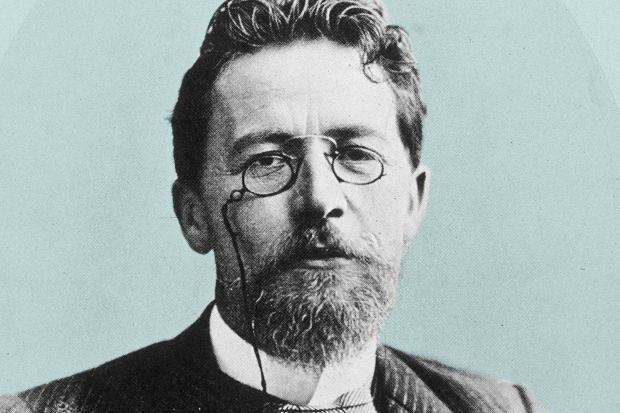
In this letter to his admirer, the young writer Maxim Gorky, Chekhov offers both praise and criticism. Alexei Peshkov, who took on the name Maxim Gorky as a political provocation (Gorky means bitter in Russian), became a key figure in the Marxist social-democratic movement and suffered multiple arrests for his beliefs. The friendship between the two authors blossomed shortly after this letter; when Tsar Nicholas II revoked Gorky’s professorship, Chekhov quit his own position in protest. Of the charismatic figure, Chekhov said, “A time will come when people will forget Gorky’s works, but he himself will hardly be forgotten even in a thousand years.”
To Alexei Peshkov (Maxim Gorky)
Yalta
3 December, 1898
Dear Alexei Maximovich,
I very much enjoyed your last letter. Thank you from the bottom of my heart. I wrote Uncle Vanya a very long time ago. I have never seen it staged. In the last few years it has often been produced in provincial theaters, perhaps because I included it in my volume of collected plays. I feel indifferent toward all my plays and have long since ceased following the theater. I have no desire to write for the theater any more. You ask what I think of your stories. What do I think? You talent is not to be doubted, and it is a genuine major talent to boot. It manifested itself with extraordinary power, for instance, I love your story, “In the Steppe.” I actually felt envious at not having written it myself. You are an artist and an intelligent man. You have an admirable ability to feel. You are three-dimensional, i.e., when you describe a thing, it becomes visible and palpable. That is genuine art. There you have what I think, and I’m very glad to be able to tell it to you. I’m very glad, I repeat, and if we were to get to know one another and chat for an hour or two, you would become convinced of how highly I esteem you and what hopes I place on your talent.
Shall I talk about your shortcomings now? That’s not quite so easy. Talking about a talent’s shortcomings is like talking about the shortcomings of a tall tree growing in the garden; the issue at hand is not the tree itself, but rather the tastes of the person looking at the tree. Isn’t that so? I’ll start by saying that, in my opinion, you lack restraint. You are like a spectator in the theater who expresses his delight with so little restraint that he prevents himself and others from listening. This lack of restraint is especially evident in the nature descriptions you use to break up your dialogues. When I read them—these descriptions—I feel I’d like them to be shorter, more compact, only about two or three lines long. Frequent reference to languor, murmuring, plushness and the like give your descriptions a rhetorical quality and make them monotonous; they discourage the reader and become almost tiresome. The same lack of restraint is evident in your descriptions of women (“Malva,” “On the Rafts”) and love scenes. It is neither a majestic sweep nor bold strokes of the brush; it is simply lack of restraint. Then the frequent uses of words that do not belong in the type of stories you write—such words as musical accompaniment…[and] harmony—is annoying. You often speak of waves. In your descriptions of intellectuals I feel a tenseness somewhat akin to caution. That doesn’t come from not having observed intellectuals enough. You know them, but you don’t know exactly from what angle to approach them.
How old are you? I don’t know you, I don’t know where you come from or who you are. But I feel you ought to leave Nizhny for two or three years while you’re still young and rub shoulders with literature and the literary world—not to learn the ropes from us and become a real pro, but to submerge yourself in literature totally and grow to love it. Besides, people age faster in the provinces. Korolenko, Potapenko, Mamin, Ertel are all wonderful people. They may bore you abit at first, but you’ll get used to them in a year or two and come to value them as they deserve, and their company will more than make up for the discomforts and inconveniences of life in the capital.
I’m off to the post office. Keep well and happy. I clasp your hand. Thank you once again for your letter.
Yours.
From Letters of Anton Chekhov. Translated by Michael Henry Heim. New York: Harper Row (1973).
FURTHER READING
Gorky’s recollection of Chekhov in his later years.
Gorky and Chekhov in a mutual moment of contemplation, c. 1900, in Yalta.
A description of Gorky’s literary career (which, at the time of this letter’s writing, was just beginning).


